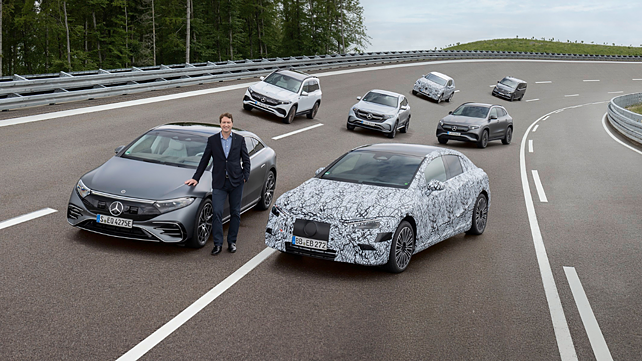
German luxury car manufacturer, Mercedes-Benz is planning to go all-electric by the end of the decade. For this, the company on Thursday unveiled a comprehensive plan that includes significantly accelerating R&D. In total, investments into battery electric vehicles between 2022 and 2030 will amount to over €40 billion.
By 2022, Mercedes-Benz will have battery electric vehicles (BEV) in all segments the company serves, announced the company. Further, from 2025 onwards, all newly launched vehicle architectures will be electric-only and customers will be able to choose an all-electric alternative for every model the company makes.
Mercedes-Benz intends to manage this accelerated transformation while sticking to its profitability targets.
“The EV shift is picking up speed – especially in the luxury segment, where Mercedes-Benz belongs. The tipping point is getting closer and we will be ready as markets switch to electric-only by the end of this decade,” said Ola Källenius, CEO, Daimler AG and Mercedes-Benz AG.
Källenius said this step marks a profound reallocation of capital. By managing this faster transformation, while safeguarding our profitability targets, the company will ensure its enduring success, he said.
Mercedes-Benz expects China to play a key role in accelerating its electrification strategy.
Product & technology strategy
In terms of technology, the company will launch three electric-only architectures by 2025 – the MB.EA, AMG.EA and VAN.EA – all catering to different segments of the luxury carmaker portfolio.
The MB.EA will cover all medium to large size passenger cars, establishing a scalable modular system as the electric backbone for the future EV portfolio, while AMG.EA will be a dedicated performance electric vehicle platform addressing technology and performance-oriented Mercedes-AMG customers.
The third platform – VAN.EA will bring in a new era for purpose-made electric vans and Light Commercial Vehicles, which will contribute to emission-free transportation and cities in the future, the company said.
Apart from this, Mercedes-Benz will also acquire UK-based electric motor company YASA to get access to unique axial flux motor technology and expertise to develop next-generation ultra-high performance motors. In-house electric motors, such as the eATS 2.0, are a key part of the strategy with a clear focus on efficiency and the overall cost of the entire system, including inverters and software.
From a battery perspective, the company is eyeing battery capacity of more than 200 Gigawatt hours and plans to set up eight Gigafactories for producing cells, together with its partners around the world. These eight Gigafactories will be in addition to the company’s already planned network of nine plants dedicated to building battery systems.
Mercedes-Benz will work with partners like SilaNano for the next battery generation, to further increase energy density by using silicon-carbon composite in the anode. This innovative solution will allow for unprecedented range and even shorter charging times. The company is also in discussion with other partners to develop solid-state battery technology.
With regard to cell manufacturing, Mercedes-Benz intends to team up with new European partners to develop and efficiently produce future cells and modules. Cell production will give Mercedes-Benz the opportunity to transform its established powertrain production network, the company claimed.
For charging, Mercedes-Benz is working with Shell on expanding the charging network. Customers will get enhanced access to Shell’s Recharge network consisting of over 30,000 charge points by 2025 in Europe, China, and North America – including over 10,000 high-power chargers globally.
All passenger car and battery assembly sites run by Mercedes-Benz AG will switch to carbon-neutral production by 2022. To enhance manufacturing efficiency the carmaker is joining forces with GROB, a German global leader in highly innovative battery production and automation systems, strengthening its battery production capacity and know-how. The cooperation focuses on battery module assembly as well as pack assembly.
The company also plans to install a new battery recycling factory in Kuppenheim, Germany, to develop and secure recycling capacity and know-how. Start of operations will be in 2023, depending on the outcome of promising discussions with public authorities.
Revised vision, revised targets
Meanwhile, Mercedes-Benz has revised its target from selling 25% hybrid and electric vehicles by 2025 to 50% by 2025.
An important lever is to increase net revenue per unit by raising the proportion of high-end electric vehicles such as Mercedes-Maybach and Mercedes-AMG models, while at the same time taking more direct control over pricing and sales.
Rising revenue from digital services will further support results. Mercedes is also working on further reducing variable and fixed costs and cutting the CAPEX share of investments. Common battery platforms and scalable electric architectures combined with advances in battery technology will bring higher degrees of standardisation and lower costs, said the company.
Investments in combustion engines and plug-in hybrid technologies will drop by 80% between 2019 and 2026. On this basis, Mercedes-Benz projects company margins in a BEV world that are similar to those in the ICE era.
“Our main duty in this transformation is to convince customers to make the switch with compelling products. For Mercedes-Benz, the trailblazing EQS flagship is only the beginning of this new era,” Källenius said.
The company is currently developing the Vision EQXX, an electric car with a real world range of more than 1,000 km, targeting a single-digit figure for Kwh per 100 km at normal highway driving speeds.
While the world premiere has been scheduled for 2022, a multi-disciplinary team including experts from Mercedes-Benz’s F1 High Performance Powertrain division (HPP) is currently working towards meeting the project’s ambitious goals. Technological advances made with Vision EQXX will be adapted and applied for potential use in new electric architectures, said the company.